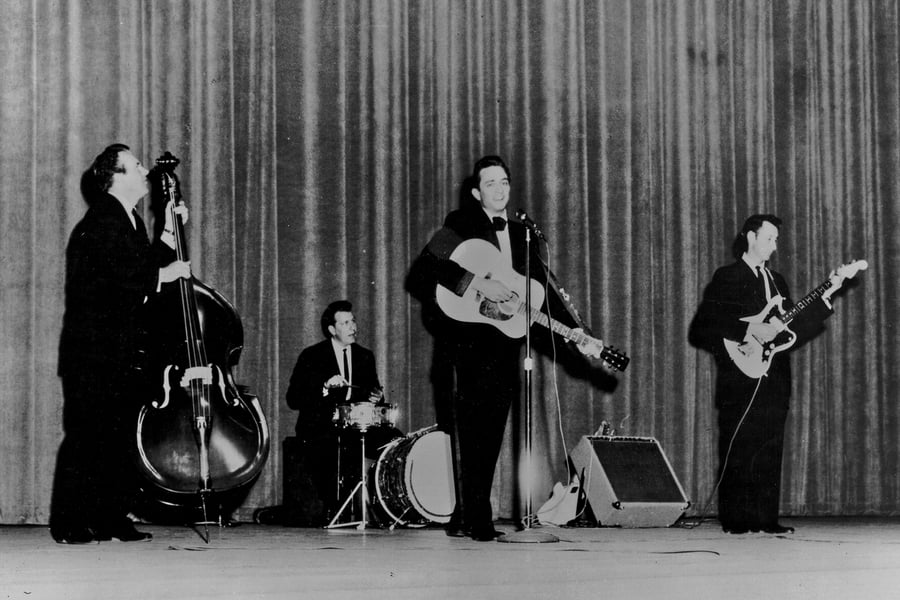W.S. “Fluke” Holland, longtime drummer for Johnny Cash and Carl Perkins and the original drummer in Cash’s famed Tennessee Three backing band, died Wednesday at the age of 85.
Dubbed the “Father of the Drums” by Cash, Holland died at his home in Jackson, Tennessee, following a short illness, the Commercial Appeal reported.
Despite his presence on some of Sun Records’ most essential recordings and his decades-long tenure alongside Perkins and Cash, Holland was not a drummer by trade: As he told the Jackson Sun in 2016, he would happen to frequent the same Memphis taverns where Perkins and his band played, and was recruited to tap along with the rhythm on a bass guitar.
“For some reason I would go to some of the places they were playing. On some of the up-tempo songs, I would walk out next to the bass and keep time,” Holland said. “When I told him I didn’t know how to play, he told me that ‘keeping time on the bass like you do, you could play drums.’”
In 1954, Perkins told Holland to get a drum set — “I had never played drums before, and Carl asked me to borrow a drum set and come play with them,” Holland told MLive in 2012 — for their Sun Studios session. As the left-handed Holland wasn’t a drummer, he didn’t know how to properly arrange his kit, which accidentally resulted in his trademark “high hat” misplacement and the drum sound he would become known for.
“My nickname is ‘Fluke’ because everything I ever did seemed like a fluke,” Holland told the Jackson Sun.
During his tenure with Perkins — which included the recording of rockabilly classics like “Blue Suede Shoes,” “Honey Don’t” and “Matchbox — Holland served as drummer during the famed “Million Dollar Quartet” sessions at Sun Studios with Perkins, Cash, Jerry Lee Lewis, and Elvis Presley.
Love Music?
Get your daily dose of everything happening in Australian/New Zealand music and globally.
In 1959, Holland was also invited to record alongside one-time Sun Records signee Cash and the Tennessee Two, guitarist Luther Perkins and bassist Marshall Grant. Holland would spend the five decades as Cash’s drummer, playing on classics like 1964’s I Walk the Line, 1965’s Orange Blossom Special, and 1968’s landmark At Folsom Prison.
In 2018, for the 50th anniversary of At Folsom Prison, Holland talked about the legendary concert as part of a Rolling Stone oral history about the album.
“I remember so well, that was the days when we didn’t have monitors on the stage and we couldn’t hear what was going on,” Holland said. “All they had was this house system. And when we got through with the song and went to the next song that John would start to do, we had no idea what it was going to be. So he’d start singing the song, and we couldn’t hear. We’d just start playing something. We didn’t know if we was doing the right thing or whatever, but everything worked out really good.”
Holland added, “After that album was released and become a hit, it quadrupled the amount of people that knew about Johnny Cash. And then came the San Quentin album. I think that’s the two things that skyrocketed him to stardom. Then the thing that put the icing on the cake, as we call it, in the late Sixties and early Seventies, was when we did the weekly ABC network show [The Johnny Cash Show], and of course that just finished it up. I don’t know if that could have happened, though, if the prison shows hadn’t happened before that. That set Johnny Cash up.”
While the Tennessee Three — who played on the majority of Cash albums throughout the Seventies — were dissolved by 1980, Holland remained Cash’s drummer in both the studio and the stage until the Man in Black’s death in 2003.
Looking back at his career in 2012, Holland told MLive, “Country and hillbilly music had only had guitars, bass and piano for all these years. When I added the drums, people started calling it rock n’ roll.”
From Rolling Stone US




































